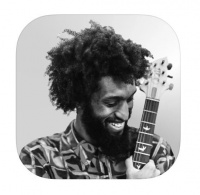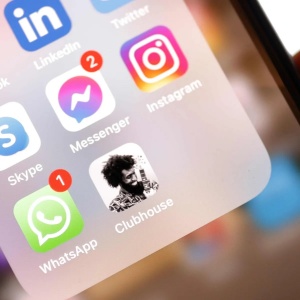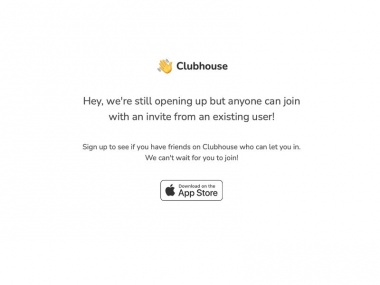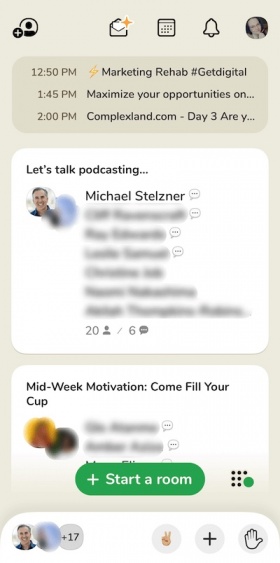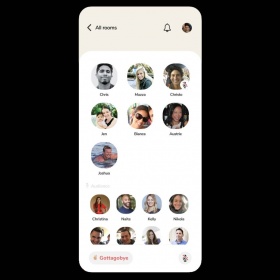Difference between revisions of "Clubhouse"
(Addition to privacy) |
(Added another picture) |
||
| Line 20: | Line 20: | ||
== History == | == History == | ||
=== Creation === | === Creation === | ||
| + | [[File:Paul-davison.jpeg|250px|right|thumb| Paul Davison Clubhouse Co-Founder]] | ||
[[File:Clubhouse-website-screenshot.jpg|380px|right|thumb| Clubhouse's invitation system]] | [[File:Clubhouse-website-screenshot.jpg|380px|right|thumb| Clubhouse's invitation system]] | ||
Founders Paul Davison and Rohan Seth previously worked on multiple entrepreneurial ventures together. Their most notable one was Talkshow, an application that allowed users to hold public text conversations.<ref name = "nguyen"> Nguyen, T. (2021, February 10). “Clubhouse, the invite-only audio app, explained”</ref> Their goal with Clubhouse was to make a social app driven by “conversations rather than posts.” The iOS app started off as invitation only, giving each new member 2 invites to send to their friends. | Founders Paul Davison and Rohan Seth previously worked on multiple entrepreneurial ventures together. Their most notable one was Talkshow, an application that allowed users to hold public text conversations.<ref name = "nguyen"> Nguyen, T. (2021, February 10). “Clubhouse, the invite-only audio app, explained”</ref> Their goal with Clubhouse was to make a social app driven by “conversations rather than posts.” The iOS app started off as invitation only, giving each new member 2 invites to send to their friends. | ||
Revision as of 22:08, 28 March 2021
|
Contents
History
Creation
Founders Paul Davison and Rohan Seth previously worked on multiple entrepreneurial ventures together. Their most notable one was Talkshow, an application that allowed users to hold public text conversations.[5] Their goal with Clubhouse was to make a social app driven by “conversations rather than posts.” The iOS app started off as invitation only, giving each new member 2 invites to send to their friends.
Notable Events
The joining of notable celebrities spiked Clubhouse’s usage since their early development in March 2020. Notable celebrities such as Elon Musk, Mark Zuckerberg, and Drake have all joined the platform. Musk notably held a Clubhouse conversation with Robinhood CEO Vladimir Tenev about the unprecedented rise of GameStop stock [5]. This incident surpassed the app's conversation room limits and was recorded and livestreamed on YouTube.
Growing Competition
The competition for Clubhouse has grown as social media platforms have been actively testing similar audio-based products and functionality. On March 10th, Twitter released a new app update to experiment with their new audio based platform: Spaces, which features similar functionalities to Clubhouse.[6] Meanwhile Facebook, Slack, and Discord has additionally been heavily rumored to be building a similar product as well. [7] [8]
Features
Profile
Similar to other social media platforms, Clubhouse allows each user to create a profile. Each profile may contain a profile photo, follower and followers count, a small bio, and an @ handle. The application features a plain-text editor not restricting users from adding emoji’s to their profile, direct messaging, and their comments. The application additionally allows users to connect their Twitter and Instagram accounts to help users find people to connect with. [5]
Clubhouse Hallway
The Hallway is Clubhouse’s name for their main feed. Here, users can find active and ongoing chatrooms to drop into along with the ability to schedule their own room. At the top right corner, users have the ability to search for a member, invite new members to clubhouse, view a calendar with upcoming rooms, view their notifications, or edit their Clubhouse profile.[5]
Clubhouse Rooms
In Clubhouse, rooms are available to access from The Hallway and users can jump in and out of rooms as long as the room size is under a set limit. The three main roles of users on Clubhouse are Listeners, Speakers, and Moderators. When you first join a Clubhouse room you join as a listener who can listen in on speakers in a room. Listeners can be upgraded to either Speakers or Moderators. Speakers have the ability to mute and unmute their microphone and speak for everyone there, while moderators are given the ability to moderate the room through promoting and demoting user roles. [5]
Unique Uses
Businesses on Clubhouse
Clubhouse actively pushes for big brands and creative collectives to adopt their platform. In December 2020, Clubhouse announced its Creator Pilot Program, offering in-house services to help brands produce events and widen their reach. Audio Collective, an audio creator community, is an example of a company that took advantage of this program, offering partnerships with creators and brands to build audio events on the iOS app. [9]
China
Clubhouse, in the early stages of its development, was commonly used by users in China to freely express their opinions against Chinese government censorship. [10] Many users recount that the non-permanent nature of Clubhouse influenced people to share more personal stories and have conversations with less of a filter. For Chinese users, the range of discussions included many political discussions that were otherwise not allowed on Chinese Internet. The Chinese government eventually blocked Clubhouse on February 8th.[11]
Ethical Concerns
Privacy
Clubhouse has faced multiple accusations of mishandling user data. In one instance, the Stanford Internet Observatory confirmed that Agora Inc., the company that provides the backend infrastructure for the mobile app, was based out of Shanghai, China. [12]This raised many concerns as Internet traffic indicated that users were still ultimately using the application. Furthermore, many have pointed at Clubhouse's lack of industry-standard security practices which are needed to adequately protect user data. Bloomberg in a recent article highlighted the existence of third-party websites that were web scraping and organizing Clubhouse chatroom audio for later streaming at a different site.[13] Clubhouse’s lack of anti-scraping technology meant that virtually anyone could easily record the activity from a public channel. [3] In a different instance, Clubhouse was criticized for making shadow profiles for users that were not even on the application. People have anecdotally claimed that Clubhouse creates these from the contact lists of users currently on the application. [14] Lastly, many have cited concerns with Clubhouse recording the audio from their chat rooms. The platform's Privacy Policy claims that such practices are necessary for investigating instances regarding community guidelines. [15]
Lack of Moderation
Clubhouse’s lax moderation on its platform has encouraged its users to discuss topics that are normally censored on other platforms. Numerous public figures associated with QAnon and other similar extremist groups were early adopters of Clubhouse, using the app to communicate with their supporters.[16] The app, which is similar to other social media platforms, has continuously struggled with misinformation campaigns. To mitigate this issue, on March 5th, 2021, Clubhouse updated their community guidelines and released new tools to report specific instances that violated such guidelines.
Spread of Misinformation
Clubhouse is particularly vulnerable to misinformation and disinformation campaigns due to the relative difficulty of confirming claims during conversation. The flow of listening and talking is unfiltered by nature and interrupting speakers isn't possible in certain rooms. Thus, speakers and moderators can significantly impact the topic and direction of conversations. Much of the app's initial appeal to users revolved around creating a safe space outside of the rampant Cancel Culture ongoing in other mainstream social media platforms like Twitter. However, users being incentivized to speak freely is not conducive to creating safe environments since users of malicious intent can act with little to no repercussions from aforementioned lax moderation. Racism, conspiracy theories, and gaslighting are some of countless methods of spreading disinformation which have inevitably surfaced on Clubhouse. In particular, conspiracy theories related to the coronavirus and the anti-vaccination movement have already been disseminated very recently through Clubhouse.[17] It has also been reported that Clubhouse unknowingly hosted anti-Semitism, LGBTQ+ hate speech, and false health claims. In terms of relations between speakers and listeners, the unique connections that Clubhouse offers its influencers and their fans can strengthen parasocial bonds but can create new outlets for misinformation and abuse as well. One journalist interrogated Kevin Hart on questionable moments of his career through a Clubhouse room but was unable to conduct the interview properly due to frequent interruptions from other users defending him.[18] While users can affect influencers, the inverse is arguably the app's most controversial and worrying feature. Elon Musk has been criticized for encouraging his Clubhouse listeners to invest in GameStop and cryptocurrencies like bitcoins or dogecoin, assets that he has financial ties with. Within Clubhouse, influencers wield exponentially more power and not necessarily for the better as their self-interests aren't always aligned with the general public's.
Accessibility
Accessibility has been a growing concern of Clubhouse. First, Clubhouse is exclusive in nature due to its invite process; this can lead to a lack of diversity and inclusivity for groups who are typically left out of conversations. Part of the appeal of the app is its “invite” set up. The users of this app include: tech elites/celebrities, high performers of hustle culture, and the privileged [19]. Additionally, Clubhouse is only available on iPhones, which makes the app less accessible due to the expenses needed to purchase an iPhone making Clubhouse favored among upper class users [20]. Additionally, the app's design excludes people with disabilities. Since it is an audio chat app, those who are d/Deaf cannot access the app; there is also a lack of support for live captioning which would allow those hard of hearing to access the app [21]. On top of the accessibility issue for those hard of hearing, the visibility for those with vision issues is a problem; the app does not support text resizing and has difficult to read text [21]. This app is one that would typically appeal to people with vision issues, as it is an audio chat app, but the design of the app actually makes it less friendly for those individuals. When designing an app, it is important to consider who can access it. “Accessibility should not be an afterthought, but rather a priority a necessity” [22].
References
- ↑ Roose, K. (2021, February 25). “Can Clubhouse Move Fast Without Breaking Things?”
- ↑ Griffith, E. (2021, February 15). “Clubhouse, a Tiny Audio Chat App, Breaks Through”
- ↑ 3.0 3.1 Newman, L. (2021, February 26). “Clubhouse’s Security and Privacy Lag Behind Its Explosive Growth”
- ↑ Davidson, P. (2021, January 24 “Welcoming More Voices” Clubhouse Blog
- ↑ 5.0 5.1 5.2 5.3 5.4 Nguyen, T. (2021, February 10). “Clubhouse, the invite-only audio app, explained”
- ↑ Hollister, S. (2021, March 10). “Twitter plans to let anyone start hosting Twitter Spaces in April”
- ↑ Isaac, M. (2021, February 10). “Facebook Is Said to Be Building a Product to Compete With Clubhouse”
- ↑ McKay, T. (2021, March 26). “Boldly Following Every Other Tech Company, Slack Is Cloning Clubhouse Now”
- ↑ Lorenz, T. (2021, March 4). “The Era of Audio Creators Has Arrived”
- ↑ Yuan, L. (2021, March 1). “The Great Firewall Cracked, Briefly. A People Shined Through.”
- ↑ McDonald, J. (2021, February 9). China blocks Clubhouse, app used for political discussion ABC News
- ↑ Lyons, K. (2021, February 14). “Clubhouse says it will improve security after researchers raise China spying concerns.”
- ↑ Tarabay, J. (2021, February 21). “Clubhouse Chats Are Breached Raising Concerns Over Security”
- ↑ Jackson, J. (2021, February 12). “Clubhouse Is Getting Criticized for Making Profiles for People Who Aren't Even on the App”
- ↑ Aten, J. (2021, February 27). “Clubhouse Is Recording Your Conversations. That's Not Even Its Worst Privacy Problem”
- ↑ Schiffer, Z. (2020, September 30). “A Clubhouse conversation has sparked accusations of anti-Semitism” Lack of moderation alt right
- ↑ Shadijanova, D. (2021, February 10). "The Problem With Clubhouse" Vice Media
- ↑ Scott, N. (2021, January 12). "Clubhouse wanted to be different. But bigotry flourished anyway" GQ Magazine
- ↑ Clubhouse
- ↑ What Clubhouse Means for Deaf and Hard of Hearing Users
- ↑ 21.0 21.1 Clubhouse Is A Club So Exclusive, It Excludes Disabled People By Design
- ↑ Reflection point: usability, accessibility, and ethics in UX
